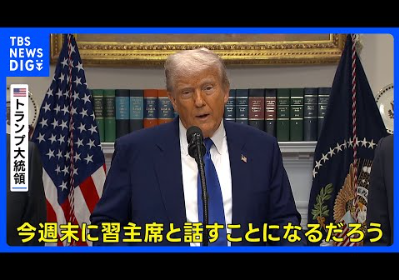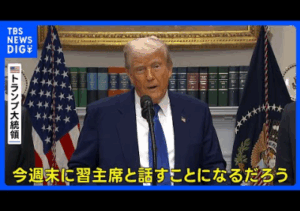【Shigeo’s Review】
U.S. President Trump has indicated his intention to speak with President Xi Jinping by phone this weekend following an agreement with China to lower tariffs.
U.S. President Trump
“I will probably talk to President Xi this weekend. The best thing that happened was that China agreed to let the Chinese market open up and allow American companies to come in.”
President Trump acknowledged on April 12 that the U.S. and China have “achieved a total reset” with both sides agreeing to a 115% reduction in tariffs. He then said, “I intend to meet with President Xi Jinping later this week.”
President Trump further explained that “the Chinese side has agreed to open up the market and allow American companies to come in.
However, he also said, “I think it will take a little more time” until a written agreement on market opening is reached.
Meanwhile, he stated that he would not review the item-specific tariffs that are in effect on automobiles, steel, and aluminum.
Trump said, “We have a very good relationship with China. We have no intention of hurting China,” he said, appealing for an easing of tensions.
President Trump’s latest move on tariff reductions between the U.S. and China marks an important turning point in the relationship between the two countries.
According to reports, Trump recognized that “a total reset has been achieved” after both the U.S. and China agreed to a 115% complete tax reduction on January 12. This expression indicates a strong willingness to clean up the trade friction and tensions that have persisted and make a fresh start.
First of all, it is worth noting that Trump announced his intention to hold a phone call with President Xi Jinping later this week.
This is believed to be aimed at promoting prompt and concrete discussions on a variety of issues, including trade issues, through direct communication between the two leaders. The realization of the phone conversation is an important step toward improving relations between the two countries, and there are high expectations for further progress in the talks.
President Trump also emphasized that the Chinese side has agreed to open its market, opening the way for American companies to enter the Chinese market.
Until now, the Chinese market has been known for its high barriers to entry for foreign companies, but if the agreement is actually implemented, the economic ties between the U.S. and China could be further strengthened.
However, Trump himself has stated that it will take some time to complete the agreement on market opening, and therefore, a cautious approach will continue to be required in order to realize the agreement in concrete terms.
On the other hand, it should not be overlooked that Mr. Trump has clearly stated that he will maintain the complete taxation of automobiles, iron ore, and aluminum.
These items are considered important from the perspective of protecting U.S. industry and maintaining domestic employment, and the government has indicated a cautious stance toward eliminating tariffs on them. From this point of view, it is clear that gradual and selective easing, rather than complete trade liberalization, is underway.
Trump has emphasized the easing of tensions by stating that “our relationship with China is very good and we have no intention of hurting China,” and he has also shown an emphasis on dialogue and cooperation in his policy toward China.
This can be seen as a turnaround from the confrontational statements and policies of the past, and a course correction toward a direction of economic coexistence and co-prosperity between the two countries.
Given the current complexities of the global economy, it is essential for both the U.S. and China to build a stable relationship, and such statements have a certain significance.
Overall, while the announcement has the potential to alleviate some of the uncertainty in the global economy caused by the prolonged U.S.-China trade friction, further progress is essential for many of the details and agreements to materialize.
Many issues remain, including specific documents and implementation methods for market opening and tariff reductions, as well as consistency with the economic policies of both countries. The upcoming telephone conversation with President Xi Jinping and the results of the subsequent discussions will be the focus of attention.
Companies and investors need to carefully monitor the situation in response to these developments, but at the very least, as the phrase “total reset” suggests, there is certainly a sense of anticipation for a new phase.
Depending on future developments, this could have a positive impact on the global economy as a whole, and in that sense, this development is important news to watch closely.





